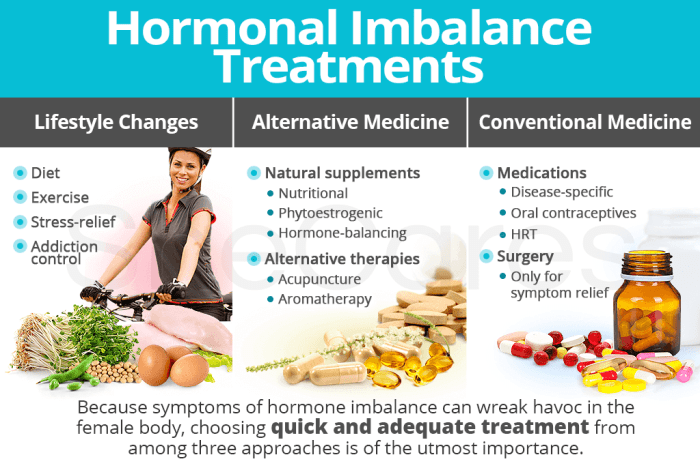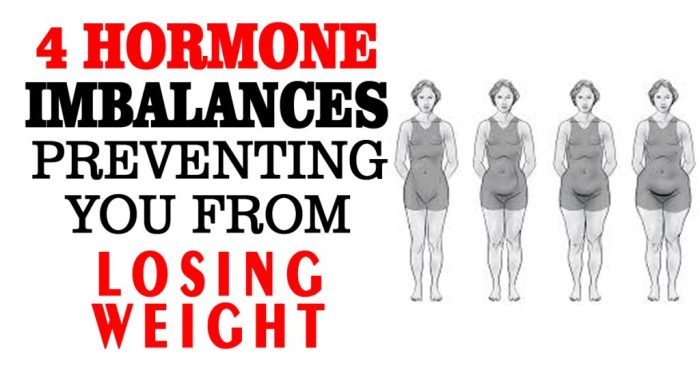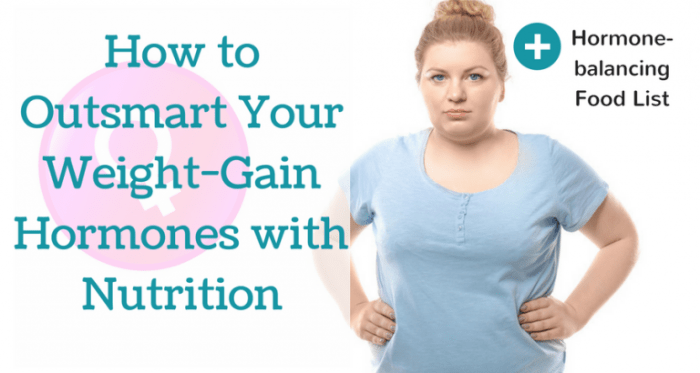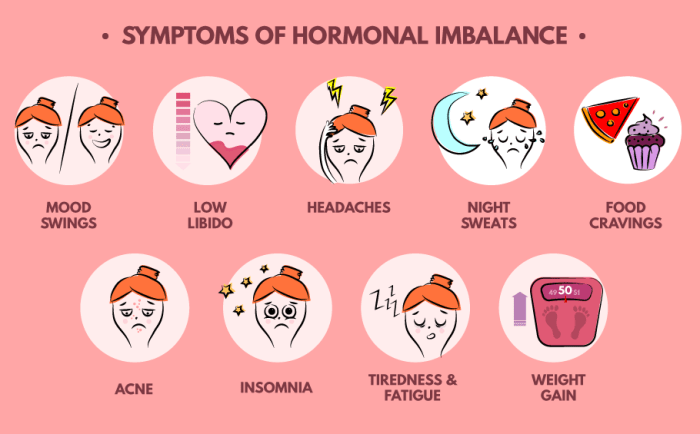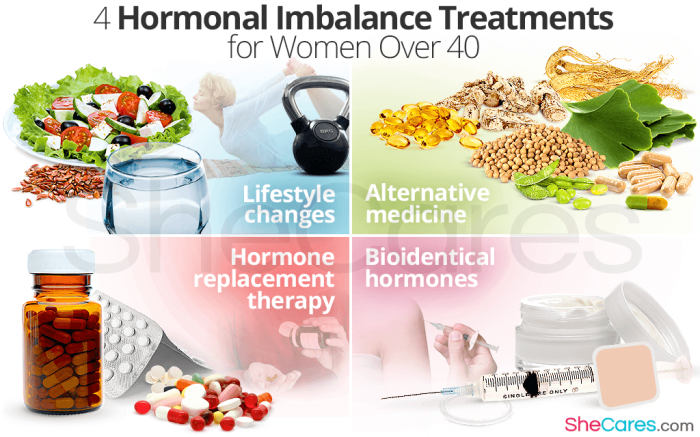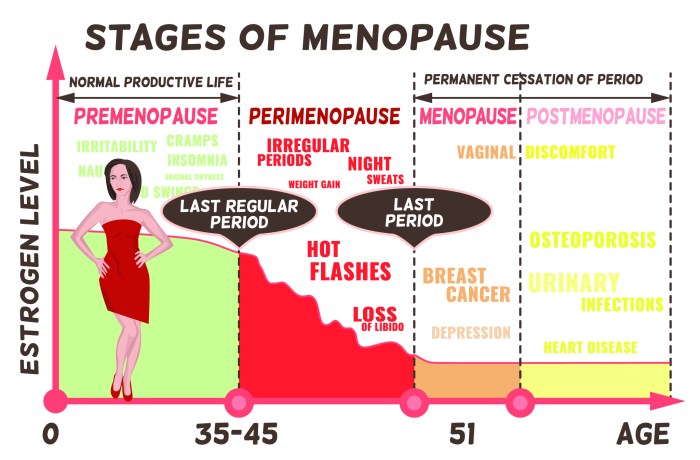How to lose weight with hormonal imbalance over 40 – Hitting a weight loss plateau after 40? You’re not alone! Hormonal imbalances can make shedding pounds an uphill battle. Let’s dive into the secrets of hormonal balance and empower you to conquer this challenge.
In this comprehensive guide, we’ll unravel the hormonal shifts that occur during perimenopause and menopause, and how they impact your metabolism and body composition. We’ll provide tailored dietary recommendations, stress-busting techniques, and lifestyle modifications to help you regain control over your weight.
Introduction
Losing weight after 40 can be particularly challenging for women due to hormonal imbalances associated with perimenopause and menopause. Studies indicate that around 60% of women over 40 experience weight gain and difficulty losing weight. Hormonal imbalances can disrupt metabolism, appetite, and body composition, making weight management a complex issue.
Understanding Hormonal Changes, How to lose weight with hormonal imbalance over 40
During perimenopause and menopause, women experience a decline in estrogen and progesterone levels. These hormones play a crucial role in regulating metabolism, appetite, and body fat distribution. As estrogen levels drop, the body becomes less efficient at burning calories and more likely to store fat around the abdomen.
Progesterone also influences appetite and mood, which can lead to increased cravings and emotional eating.
Understanding Hormonal Imbalance
Defining Hormonal Imbalance and Its Common Causes
Hormonal imbalance occurs when the body produces too much or too little of a specific hormone. This can disrupt various bodily functions, including metabolism, appetite, and weight regulation.
Common causes of hormonal imbalance include:
- Aging
- Menopause
- Polycystic ovary syndrome (PCOS)
- Hypothyroidism
- Cushing’s syndrome
- Addison’s disease
Identifying Hormonal Imbalance
If you’re a woman over 40 experiencing unexplained weight gain, it’s crucial to be aware of the potential role of hormonal imbalances. Recognizing the signs and symptoms of hormonal imbalance can empower you to seek appropriate medical evaluation and treatment.
Here are some common signs and symptoms of hormonal imbalance that may contribute to weight gain:
- Unexplained weight gain or difficulty losing weight, especially around the abdomen
- Increased appetite and cravings for sugary or salty foods
- Fatigue, lethargy, and lack of energy
- Sleep disturbances, including insomnia or excessive sleepiness
- Mood swings, irritability, and anxiety
- Changes in menstrual cycle, such as irregular periods, heavy bleeding, or skipped periods
- Hot flashes, night sweats, and other menopausal symptoms
- Dry skin, hair loss, or brittle nails
- Muscle weakness or loss of muscle mass
- Joint pain or stiffness
It’s important to note that these symptoms can also be caused by other factors, so it’s essential to consult with a healthcare professional for proper diagnosis and treatment.
To diagnose hormonal imbalances, your doctor may recommend various tests, including:
- Blood tests to measure hormone levels, such as estrogen, progesterone, testosterone, and thyroid hormones
- Urine tests to check for hormone levels and other indicators of hormonal imbalances
- Imaging tests, such as an ultrasound or MRI, to examine the ovaries, uterus, or other reproductive organs
Early detection and treatment of hormonal imbalances can help prevent further weight gain and improve your overall health and well-being.
Diet Modifications
Adjusting your diet can significantly support your weight loss journey while managing hormonal imbalances. Certain foods can trigger hormonal fluctuations, while others can help stabilize them and promote weight management.
Foods to Prioritize
Incorporate these nutrient-rich foods into your diet to support hormonal balance and weight loss:
- Fruits:Berries, apples, bananas, oranges
- Vegetables:Leafy greens, broccoli, cauliflower, carrots
- Whole grains:Brown rice, quinoa, oatmeal
- Lean protein:Chicken, fish, beans, lentils
- Healthy fats:Avocados, nuts, seeds, olive oil
Foods to Avoid
Limit or eliminate these foods that can contribute to hormonal imbalances and hinder weight loss:
- Processed foods:Packaged snacks, sugary drinks, refined carbohydrates
- Red meat:High in saturated fat, which can increase inflammation
- Dairy:For some individuals, dairy can trigger hormonal imbalances
- Sugar:Spikes insulin levels, leading to weight gain
- Alcohol:Dehydrates the body and interferes with hormone production
Exercise Plan: How To Lose Weight With Hormonal Imbalance Over 40
Regular exercise is essential for managing hormonal imbalance and promoting overall well-being. Exercise helps regulate hormone levels, improve insulin sensitivity, and boost metabolism. Here’s a sample exercise plan tailored for individuals with hormonal imbalance over 40:
Warm-up (5-10 minutes)
- Light cardio, such as brisk walking or jogging in place
- Dynamic stretching, such as arm circles, leg swings, and torso twists
Strength Training (2-3 times per week)
Strength training helps build muscle mass, which boosts metabolism and improves insulin sensitivity. Aim for 2-3 sets of 10-12 repetitions for each exercise.
- Squats
- Lunges
- Push-ups
- Rows
- Planks
Cardio (3-4 times per week)
Cardiovascular exercise helps burn calories, improve heart health, and regulate hormone levels. Aim for 30-60 minutes of moderate-intensity cardio, such as:
- Walking
- Jogging
- Cycling
- Swimming
Flexibility (1-2 times per week)
Flexibility exercises help improve range of motion, reduce muscle soreness, and promote relaxation. Include:
- Yoga
- Pilates
- Tai chi
- Stretching
Cool-down (5-10 minutes)
- Static stretching, such as holding each stretch for 30 seconds
- Deep breathing exercises
Modifications for Different Fitness Levels
If you’re new to exercise, start gradually and increase intensity and duration over time. If you have any underlying health conditions, consult with your doctor before starting an exercise program.
Contraindications
Certain exercises may be contraindicated for individuals with specific hormonal imbalances. For example, high-impact exercises may be too strenuous for those with osteoporosis. Always consult with a qualified healthcare professional before starting an exercise program.
Lifestyle Adjustments
Lifestyle adjustments play a crucial role in weight loss with hormonal imbalance. By adopting certain habits, you can optimize your body’s hormonal function and create an environment conducive to weight management.
Here are some lifestyle changes that can support your weight loss journey:
Stress Management
Chronic stress can lead to hormonal imbalances that promote weight gain. Implementing stress management techniques can help reduce stress levels and improve hormonal balance.
| Technique | Benefits | Drawbacks |
|---|---|---|
| Exercise | Reduces stress hormones, improves mood | Requires time and effort |
| Meditation | Calms the mind, reduces anxiety | Can be challenging for beginners |
| Yoga | Combines physical activity with relaxation | May not be suitable for everyone |
- Practice deep breathing exercises to reduce stress.
- Engage in regular meditation or mindfulness practices.
- Consider yoga or tai chi to combine physical activity with relaxation.
- Seek professional help if stress becomes overwhelming.
Sleep Optimization
Sleep deprivation can disrupt hormonal balance and increase cravings. Getting adequate sleep is essential for weight management.
- Aim for 7-9 hours of quality sleep each night.
- Establish a regular sleep schedule, even on weekends.
- Create a relaxing bedtime routine to promote sleep.
- Avoid caffeine and alcohol before bed.
- Make sure your bedroom is dark, quiet, and cool.
Other Lifestyle Changes
- Engage in regular exercise to boost metabolism and improve hormonal balance.
- Follow a healthy diet that nourishes your body and supports hormonal health.
- Limit processed foods, sugary drinks, and unhealthy fats.
- Stay hydrated by drinking plenty of water throughout the day.
By incorporating these lifestyle adjustments into your routine, you can create a foundation for successful weight loss with hormonal imbalance.
Hey there, over-40 warriors! If you’re struggling to shed those extra pounds due to hormonal imbalances, don’t despair. We’ve got you covered! Check out this ultimate guide on How to lose weight over 40 and keep it off . It’s packed with tips and tricks to help you conquer weight loss over 40 and reclaim your youthful glow.
But don’t forget, if hormonal imbalances are causing your weight gain, consult a healthcare professional for personalized advice to help you tackle the root cause.
Supplements and Medications
Managing hormonal imbalance may involve considering supplements or medications. While these can be helpful, it’s crucial to understand their potential benefits and risks.
Supplements and medications work by influencing hormone production, metabolism, or receptor sensitivity. However, it’s important to consult a healthcare professional before using them, as they can interact with other medications or have side effects.
When battling hormonal imbalance over 40, weight loss can seem like an uphill battle. The good news is that there are plenty of resources available, including Weight loss supplements for women over 40 . These supplements can help balance hormones, boost metabolism, and support weight loss efforts.
Paired with a healthy diet and exercise regimen, they can be a valuable tool for those looking to shed excess weight and improve their overall health.
Types of Supplements and Medications
Various supplements and medications are available for hormonal imbalance, including:
- Phytoestrogens: Plant-based compounds that mimic estrogen’s effects, such as soy isoflavones and red clover.
- DHEA: A hormone precursor that supports hormone production.
- Melatonin: A hormone that regulates sleep-wake cycles and may improve hormone balance.
- Hormone replacement therapy (HRT): Prescribed hormones that replace declining levels, such as estrogen, progesterone, or testosterone.
- Metformin: A medication used for type 2 diabetes that may improve insulin sensitivity and hormone balance.
Benefits and Risks
Supplements and medications can provide benefits, but also carry potential risks:
| Supplement/Medication | Benefits | Risks |
|---|---|---|
| Phytoestrogens | May reduce hot flashes and other menopausal symptoms | May interact with blood thinners or hormone-sensitive cancers |
| DHEA | May improve mood, energy, and libido | May cause acne, hair loss, or liver damage |
| Melatonin | May improve sleep and reduce anxiety | May cause drowsiness or headaches |
| HRT | Relieves menopausal symptoms, improves bone density | May increase risk of blood clots, heart disease, or cancer |
| Metformin | Improves insulin sensitivity, reduces blood sugar | May cause gastrointestinal side effects |
Dosage and Administration
Dosage and administration vary depending on the supplement or medication used. It’s essential to follow the healthcare professional’s instructions carefully.
Contraindications and Precautions
Certain supplements and medications may not be suitable for everyone. Contraindications and precautions include:
- Pregnancy and breastfeeding: Some supplements and medications may not be safe during pregnancy or breastfeeding.
- Underlying health conditions: Certain supplements or medications may interact with existing health conditions, such as liver or kidney disease.
- Medications: Supplements and medications may interact with other medications, affecting their effectiveness or safety.
Medical Treatment
If lifestyle changes and diet modifications fail to alleviate hormonal imbalances, medical intervention may be necessary. Medical professionals play a crucial role in diagnosing and managing hormonal imbalances, providing personalized treatment plans that may include surgical interventions or hormone replacement therapy.
Surgical interventions may be recommended in cases of hormonal imbalances caused by underlying medical conditions, such as tumors or cysts. Hormone replacement therapy, on the other hand, involves administering synthetic or natural hormones to restore hormonal balance and alleviate symptoms.
Surgical Interventions
- Removal of tumors or cysts that produce excessive hormones
- Repair of glands or organs responsible for hormone production
Hormone Replacement Therapy
Hormone replacement therapy involves administering hormones that are deficient or imbalanced in the body. This can be done through:
- Oral medications
- Injections
- Patches or gels applied to the skin
- Implants that release hormones over time
Mind-Body Connection
The mind and body are deeply interconnected, and emotional well-being plays a significant role in hormonal balance and weight management. Chronic stress, anxiety, and depression can disrupt hormonal regulation, leading to weight gain and difficulty losing weight.
To maintain hormonal balance and promote weight loss, it’s crucial to address emotional well-being through various techniques:
Mindfulness and Meditation Practices
- Mindfulness involves paying attention to the present moment without judgment, reducing stress and anxiety.
- Meditation, such as deep breathing exercises, helps calm the mind and regulate emotions.
Cognitive-Behavioral Therapy (CBT)
- CBT focuses on identifying and changing negative thought patterns that contribute to stress and emotional distress.
- It teaches coping mechanisms to manage emotional responses and reduce their impact on hormonal balance.
Exercise and Physical Activity
- Regular exercise releases endorphins, which have mood-boosting effects and reduce stress.
- Physical activity can improve sleep quality, further supporting emotional well-being.
Nutrition and Healthy Eating Habits
- A balanced diet rich in fruits, vegetables, and whole grains supports overall health, including emotional well-being.
- Avoid processed foods, sugary drinks, and excessive caffeine, which can contribute to mood swings and stress.
Social Support and Connection
- Strong social connections provide emotional support and reduce feelings of isolation.
- Spending time with loved ones, joining support groups, or volunteering can boost mood and well-being.
Sleep Hygiene and Getting Enough Rest
- Sufficient sleep is crucial for emotional regulation and hormonal balance.
- Establish a regular sleep schedule, create a relaxing bedtime routine, and ensure a comfortable sleep environment.
Self-Care and Self-Compassion
Prioritizing self-care and practicing self-compassion are essential for maintaining emotional well-being.
- Engage in activities that bring joy and relaxation, such as hobbies, spending time in nature, or pursuing creative outlets.
- Treat yourself with kindness and understanding, recognizing that setbacks are part of the journey.
Motivation and Support
Losing weight with hormonal imbalance over 40 requires dedication and perseverance. Finding support and motivation is crucial to stay on track and overcome challenges.
Consider joining support groups, connecting with friends and family who understand your journey, or working with a therapist or coach who can provide emotional support and guidance.
Setting Realistic Goals
Set realistic weight loss goals to avoid discouragement and maintain motivation. Focus on gradual, sustainable progress rather than drastic measures that are difficult to maintain.
Celebrating Successes
Acknowledge and celebrate your successes, no matter how small. This positive reinforcement will help you stay motivated and recognize the progress you’re making.
Rewarding Yourself
Reward yourself for reaching milestones to maintain motivation. Choose non-food rewards that support your weight loss goals, such as a new fitness class or a relaxing massage.
Overcoming Challenges
Anticipate challenges and develop strategies to overcome them. Seek support from your support system or healthcare provider when facing setbacks.
Finding Inspiration
Find inspiration from success stories of others who have lost weight with hormonal imbalance. Connect with them online or through support groups to learn from their experiences and gain encouragement.
Personal Stories
Embarking on a weight loss journey with hormonal imbalance can be a unique and challenging experience. Here, we share the inspiring stories of individuals who have successfully navigated this path.
These personal accounts offer valuable insights into the challenges, triumphs, and strategies that can empower you on your own weight loss journey.
Quotes from Success Stories
“After years of struggling with unexplained weight gain, I finally discovered that I had a hormonal imbalance. Once I addressed that, the weight started to come off effortlessly.”
Sarah, age 45
Tackling hormonal imbalances after 40 can be a challenge for weight loss. But don’t worry, we’ve got you covered! Check out our Weight loss recipes for women over 40 for some delicious and healthy options. These recipes are specifically designed to support your body during this hormonal transition, helping you lose weight and feel your best.
Remember, consistency is key when it comes to weight loss with hormonal imbalance, so stick to a healthy diet and exercise plan to see lasting results.
“I had tried countless diets and exercise programs without success. It wasn’t until I started working with a doctor who specialized in hormonal health that I made real progress.”
Jessica, age 48
“I found that connecting with other women who were going through similar experiences provided me with invaluable support and motivation.”
Emily, age 42
FAQs
Navigating weight loss with hormonal imbalance over 40 can raise various questions. Here’s a comprehensive list of frequently asked questions to address your concerns:
This table provides detailed, evidence-based answers to common queries, empowering you with knowledge to support your weight loss journey.
Questions and Answers
| Question | Answer |
|---|---|
| Why is it harder to lose weight with hormonal imbalance over 40? | Hormonal changes during this phase can affect metabolism, appetite regulation, and body composition, making weight loss more challenging. |
| How does hormonal imbalance impact weight loss? | Fluctuating estrogen and progesterone levels can alter fat distribution, increase cravings, and reduce energy levels, hindering weight loss efforts. |
| Can hormonal imbalance cause weight gain? | Yes, hormonal imbalances can lead to increased fat storage, particularly around the abdomen. |
| How can I identify hormonal imbalance? | Common symptoms include irregular periods, mood swings, sleep disturbances, and unexplained weight gain or difficulty losing weight. |
| What are the best diet modifications for hormonal imbalance? | Focus on consuming nutrient-rich foods, such as fruits, vegetables, lean protein, and whole grains, while limiting processed foods, sugary drinks, and unhealthy fats. |
| How does exercise help with hormonal imbalance? | Regular exercise can regulate hormone levels, improve insulin sensitivity, and boost metabolism. |
| What lifestyle adjustments can support weight loss with hormonal imbalance? | Prioritize sleep, manage stress, and engage in relaxation techniques to optimize hormonal balance. |
| Are there any supplements or medications that can help with weight loss? | Certain supplements, such as green tea extract and omega-3 fatty acids, may support weight loss, while medications like metformin can improve insulin sensitivity. |
| When should I consider medical treatment for hormonal imbalance? | If lifestyle changes and other measures do not alleviate symptoms or support weight loss, consult a healthcare professional to explore medical treatment options. |
| How can I stay motivated during my weight loss journey? | Set realistic goals, track progress, and seek support from friends, family, or a healthcare professional. |
Conclusion
Losing weight over 40 with hormonal imbalance requires a multifaceted approach. By addressing the underlying hormonal imbalances, making lifestyle adjustments, and seeking professional support, you can achieve your weight loss goals and improve your overall health and well-being. Remember, hormonal imbalance is a common issue that can be effectively managed with the right approach.
If you are struggling with weight loss over 40, don’t hesitate to seek guidance from a healthcare professional. They can help you identify any underlying hormonal imbalances and develop a personalized treatment plan to address your specific needs. With the right support and a positive mindset, you can overcome the challenges of hormonal imbalance and achieve your weight loss goals.
Concluding Remarks
Losing weight with hormonal imbalance over 40 is possible! By understanding the hormonal changes, implementing targeted strategies, and seeking professional guidance when needed, you can overcome this challenge. Remember, you’re not just losing weight; you’re reclaiming your health, vitality, and self-confidence.
Essential FAQs
What are the key hormonal changes that affect weight after 40?
Estrogen and progesterone levels decline during perimenopause and menopause, leading to a decrease in metabolism and an increase in body fat storage.
How can I adjust my diet to support hormonal balance?
Focus on whole, unprocessed foods, including fruits, vegetables, lean protein, and healthy fats. Limit processed foods, sugary drinks, and excessive caffeine.
What types of exercise are most beneficial for weight loss with hormonal imbalance?
Engage in regular cardiovascular exercise, such as brisk walking, swimming, or cycling. Strength training is also crucial for building muscle mass and boosting metabolism.
How does stress impact hormonal balance and weight loss?
Chronic stress can elevate cortisol levels, which can lead to increased appetite, cravings, and difficulty losing weight. Practice stress-reducing techniques like yoga, meditation, or deep breathing.
When should I consider medical interventions for hormonal imbalance?
If lifestyle changes alone are not effective, consult a healthcare professional to discuss potential medical interventions, such as hormone replacement therapy or medications.

